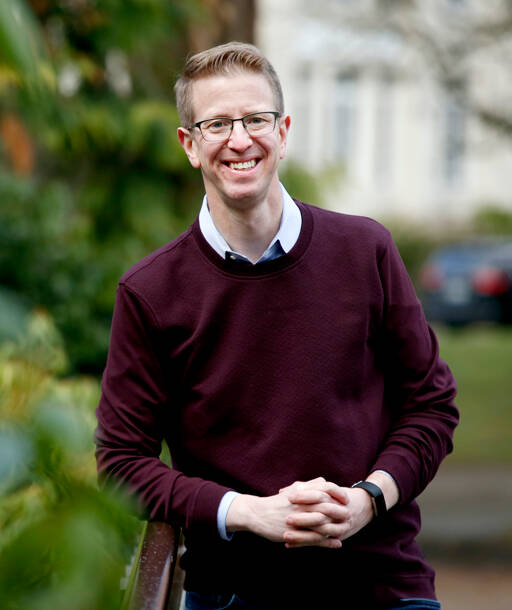PORT ANGELES — Derek Kilmer is leaving the U.S. House of Representatives and politics in January, but he won’t be leaving Washington, D.C., or the unfinished work of problem-solving issues he is passionate about, like economic opportunity and climate change.
When the Port Angeles native announced on Nov. 9, 2023, that he wouldn’t seek a seventh term as Washington’s 6th Congressional District representative, he didn’t have next steps mapped out. After devoting nearly half his life to public office, Kilmer, who turns 51 on Jan. 1, was ready for whatever came next.
“I’ve always looked at life in chapters,” said Kilmer, a Democrat, in a telephone interview. “I will have spent eight years in the state Legislature and 12 in Congress. Twenty years of serving in elected office felt about right.”
Democrat Emily Randall of Bremerton was elected to Kilmer’s seat in the Nov. 5 general election.
After Kilmer’s term ends in January, he will become senior vice president of U.S. Program & Policy at the Rockefeller Foundation, which has committed $1 billion over the next five years to address climate change and advance opportunities for individuals impacted by it.
He’ll actually spend more time on the ground in the capital, where the foundation’s policy office is located, than he did as a congressman.
The Rockefeller Foundation was among a number of institutions that approached Kilmer after he announced he would not be running for re-election. The global philanthropic organization with $6 billion in assets appealed to him, he said, because its mission overlapped with the work he had been doing over the course of his career.
“This provides an avenue to keep trying to do good things,” Kilmer said. “It’s a foundation that focuses on things that matter to our region. It’s focused on economic opportunity, it’s focused on climate change and its impacts. It’s focused on making sure that we have a strong and resilient democracy, it’s focused on food and healthcare, all of which matter in our region.”
The argument that more can get done outside of Congress than inside it did not resonate with Kilmer. He pointed to $1.9 million in funding for the Lower Elwha Klallam Family Health Clinic, $900,000 to the Port Angeles Food Bank to purchase a new building and $2.5 million to the city of Port Townsend to construct public sewer infrastructure for mixed income housing that he was instrumental in securing.
“Those are ways in which the federal government can actually make a positive impact on people’s lives, and that’s the connection that I’ve tried to make,” he said.
Among the other Clallam and Jefferson county and tribal projects that Kilmer worked to fund, as well as Sens. Maria Cantwell and Patty Murray, both Democrats, were:
• $8.6 million to the Port of Port Angeles for repair and improvements to its Intermodal Handling and Transfer Facility and $9.4 million for infrastructure and equipment upgrades to reduce greenhouse gases;
• $3 million to Port Hadlock for a sewer expansion;
• $4.8 million to the Makah Indian Tribe to expand and relocate the Sophie Trettevick Indian Health Center out of the Tsunami Inundation Zone.
Of the many projects and initiatives he has worked on during his time in office, Kilmer said he was most proud of getting the Distressed Area Recompete Pilot Program Act passed into law. The program, administered through the U.S. Department of Commerce’s Economic Development Administration, provides funding to distressed and rural communities for projects that reduce unemployment and spur economic growth.
The North Olympic Peninsula Recompete Coalition composed of regional economic development, education, tribal and local government representatives from Clallam and Jefferson counties was among the six finalists in the highly competitive program, and it received a $35 million grant that will focus on revitalizing the area’s natural resource industries.
The Recompete program was the culmination of a pursuit that began when Kilmer was still a teenager.
“My senior thesis in high school was how do you help timber towns in Washington state?” said Kilmer, who graduated from Port Angeles High School in 1992. “It’s why I worked in economic development professionally, because I saw the challenges in our region. Thirty-odd years later, you take that experience and smart ideas from other people and turn it into legislation.”
Kilmer is equally proud of his chairmanship of the Select Committee on the Modernization of Congress — a position he was handed when he first arrived in Washington, D.C.
He is credited with shepherding a bipartisan group of representatives during a time of political polarization toward comity and collaboration in making recommendations on how Congress could function more effectively. Rather than devolving into internecine dysfunction, the committee was remarkably productive, advancing more than 200 recommendations and assisting in the implementation of about 65 percent of them.
“I am someone who has tried to be a loving critic of the institution and has tried to be a steward of the institution and rather than being someone who wants to tear it down and demolish it,” he said.
Behind-the-scenes work by those in Congress usually doesn’t garner the kind of attention conflict and red-blue divide issues do, but Kilmer said it was extremely important and occurred more often than the public might think.
“I’m often asked what has surprised me in this place and there’s two things,” he said. “One is that there’s a bunch of stuff that happens under the radar and it happens in a bipartisan way. And the other thing is there’s a bunch of good people who are here for the right reasons. But for some reason, some of the big challenges facing our country get treated more like games to be won than like problems to be solved.”
________
Reporter Paula Hunt can be reached by email at paula.hunt@peninsuladailynews.com.

